MG629 Developing Leadership Skills: Next Plc Evaluation Report
VerifiedAdded on 2023/06/16
|11
|3429
|378
Report
AI Summary
This report provides an evaluation of leadership and management practices at Next Plc, focusing on the effectiveness of these practices in relation to the organization's overall performance. The analysis reveals that Next Plc primarily follows an autocratic leadership style and employs management approaches such as human behavior, contingency, social system, and management science approaches. The report also highlights key performance indicators (KPIs) for the organization, including sales performance, online and retail metrics, and financial data. Furthermore, it assesses the organizational leadership and management performance, particularly in adapting to challenges posed by the COVID-19 pandemic and maintaining ethical relationships with suppliers. The evaluation provides insights into how Next Plc leverages its leadership and management strategies to achieve its strategic goals and adapt to market dynamics.
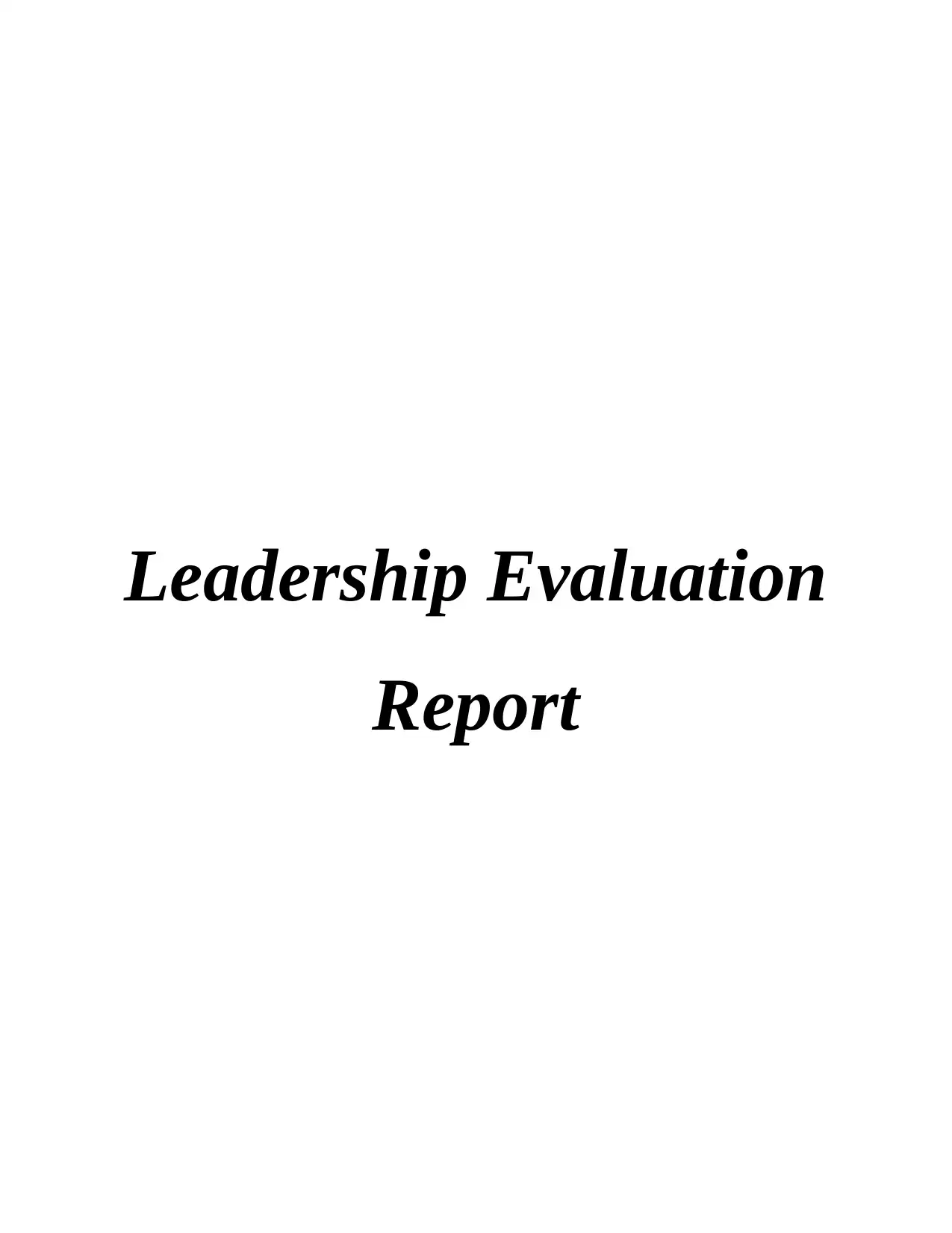
Leadership Evaluation
Report
Report
Paraphrase This Document
Need a fresh take? Get an instant paraphrase of this document with our AI Paraphraser
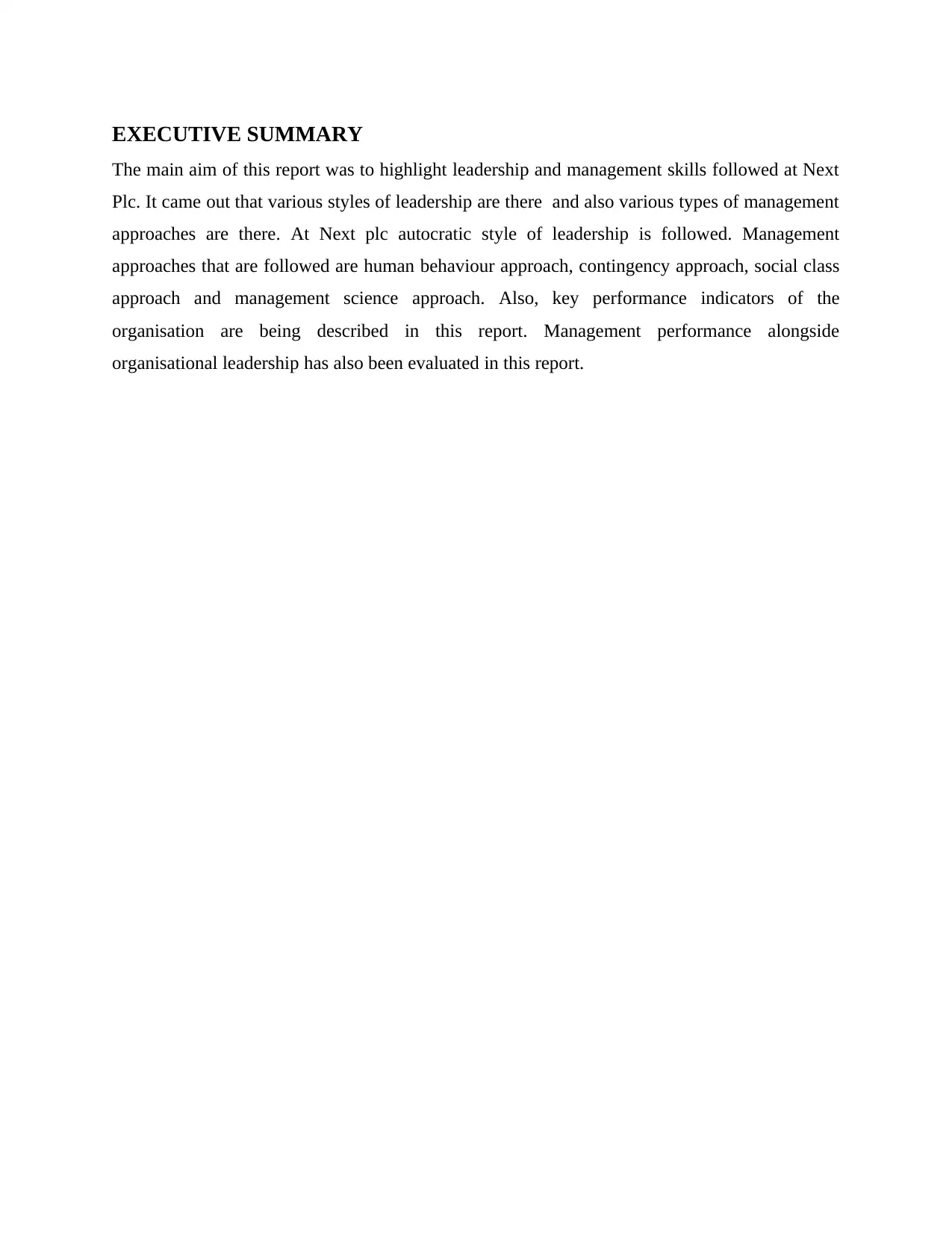
EXECUTIVE SUMMARY
The main aim of this report was to highlight leadership and management skills followed at Next
Plc. It came out that various styles of leadership are there and also various types of management
approaches are there. At Next plc autocratic style of leadership is followed. Management
approaches that are followed are human behaviour approach, contingency approach, social class
approach and management science approach. Also, key performance indicators of the
organisation are being described in this report. Management performance alongside
organisational leadership has also been evaluated in this report.
The main aim of this report was to highlight leadership and management skills followed at Next
Plc. It came out that various styles of leadership are there and also various types of management
approaches are there. At Next plc autocratic style of leadership is followed. Management
approaches that are followed are human behaviour approach, contingency approach, social class
approach and management science approach. Also, key performance indicators of the
organisation are being described in this report. Management performance alongside
organisational leadership has also been evaluated in this report.
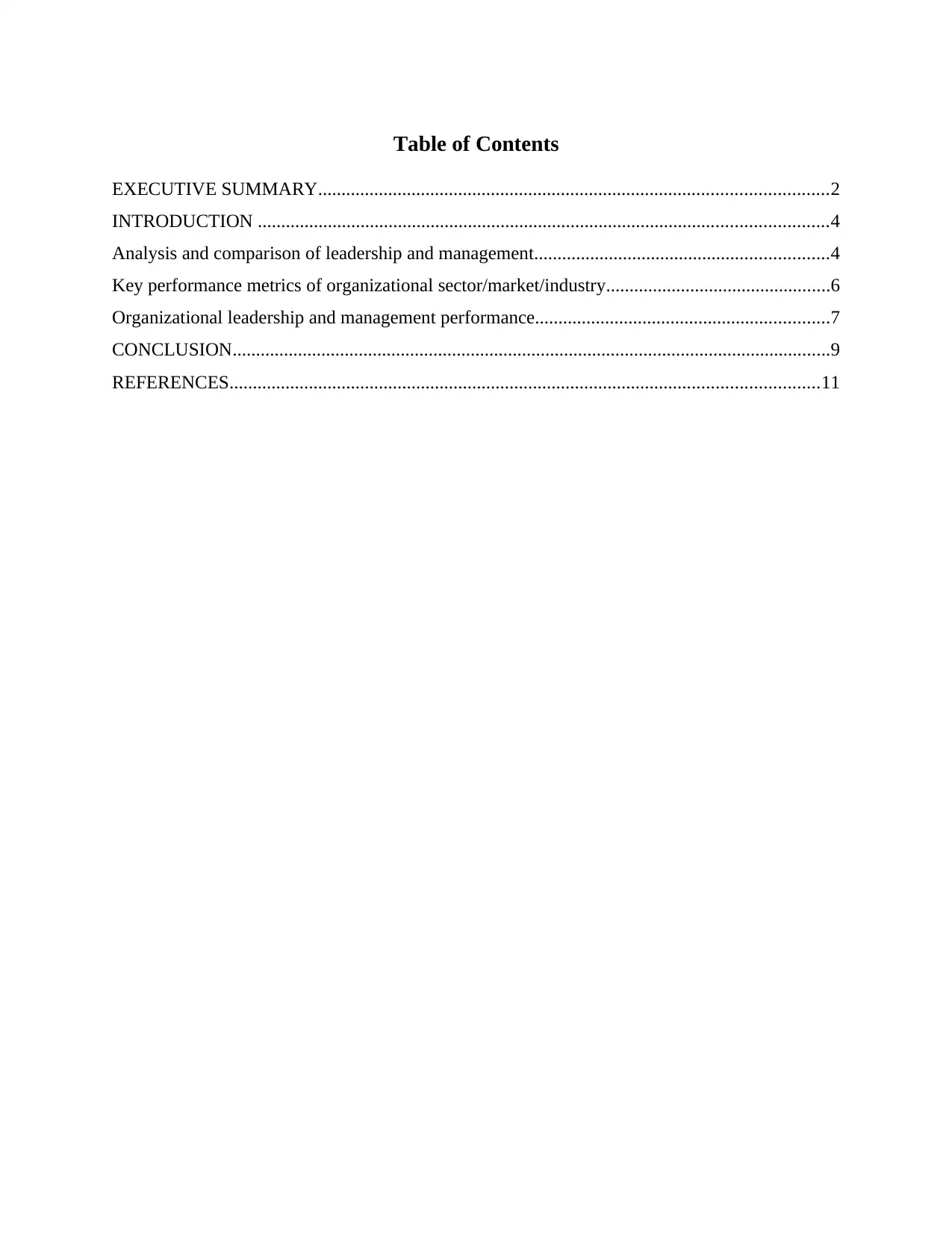
Table of Contents
EXECUTIVE SUMMARY.............................................................................................................2
INTRODUCTION ..........................................................................................................................4
Analysis and comparison of leadership and management...............................................................4
Key performance metrics of organizational sector/market/industry................................................6
Organizational leadership and management performance...............................................................7
CONCLUSION................................................................................................................................9
REFERENCES..............................................................................................................................11
EXECUTIVE SUMMARY.............................................................................................................2
INTRODUCTION ..........................................................................................................................4
Analysis and comparison of leadership and management...............................................................4
Key performance metrics of organizational sector/market/industry................................................6
Organizational leadership and management performance...............................................................7
CONCLUSION................................................................................................................................9
REFERENCES..............................................................................................................................11
⊘ This is a preview!⊘
Do you want full access?
Subscribe today to unlock all pages.

Trusted by 1+ million students worldwide
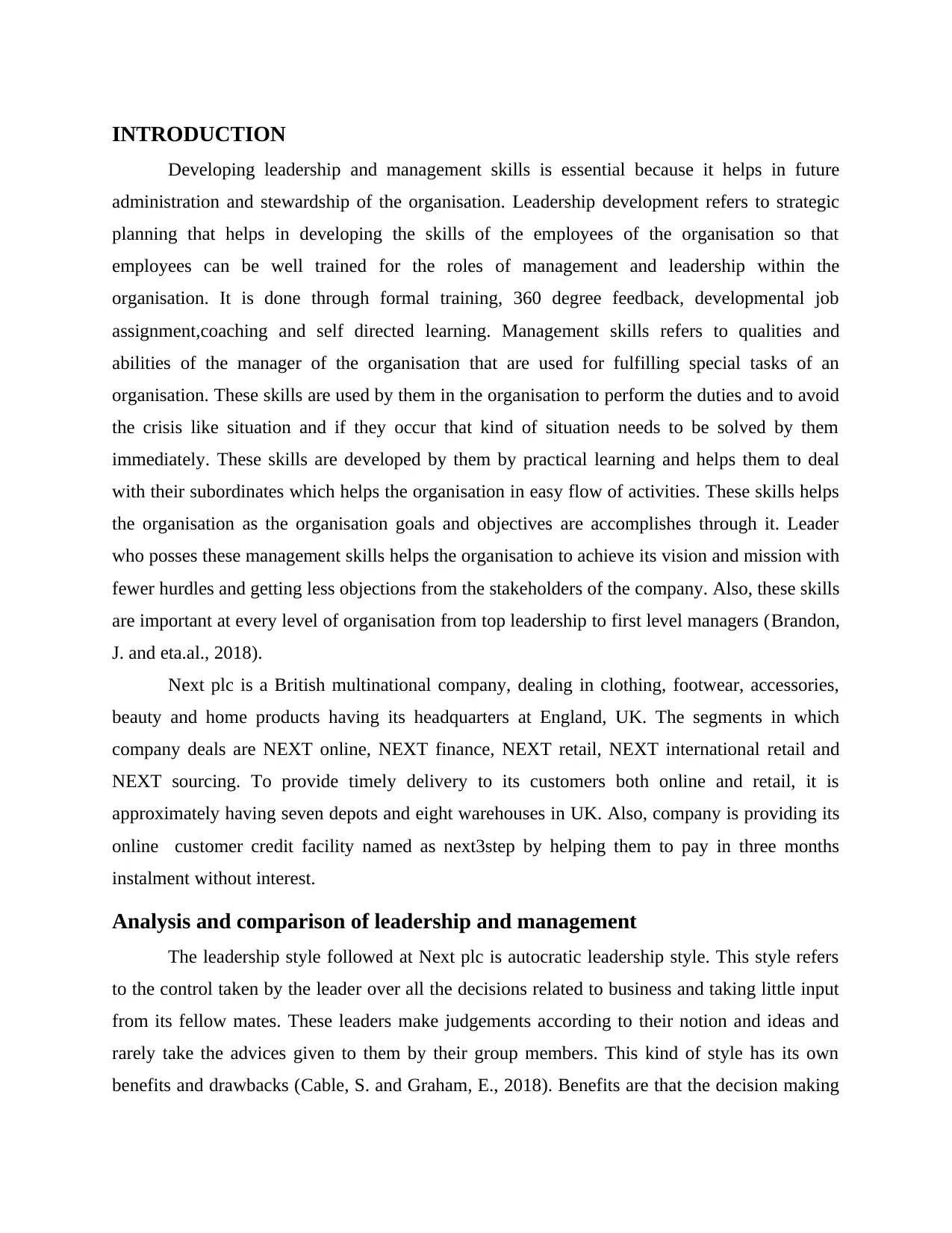
INTRODUCTION
Developing leadership and management skills is essential because it helps in future
administration and stewardship of the organisation. Leadership development refers to strategic
planning that helps in developing the skills of the employees of the organisation so that
employees can be well trained for the roles of management and leadership within the
organisation. It is done through formal training, 360 degree feedback, developmental job
assignment,coaching and self directed learning. Management skills refers to qualities and
abilities of the manager of the organisation that are used for fulfilling special tasks of an
organisation. These skills are used by them in the organisation to perform the duties and to avoid
the crisis like situation and if they occur that kind of situation needs to be solved by them
immediately. These skills are developed by them by practical learning and helps them to deal
with their subordinates which helps the organisation in easy flow of activities. These skills helps
the organisation as the organisation goals and objectives are accomplishes through it. Leader
who posses these management skills helps the organisation to achieve its vision and mission with
fewer hurdles and getting less objections from the stakeholders of the company. Also, these skills
are important at every level of organisation from top leadership to first level managers (Brandon,
J. and eta.al., 2018).
Next plc is a British multinational company, dealing in clothing, footwear, accessories,
beauty and home products having its headquarters at England, UK. The segments in which
company deals are NEXT online, NEXT finance, NEXT retail, NEXT international retail and
NEXT sourcing. To provide timely delivery to its customers both online and retail, it is
approximately having seven depots and eight warehouses in UK. Also, company is providing its
online customer credit facility named as next3step by helping them to pay in three months
instalment without interest.
Analysis and comparison of leadership and management
The leadership style followed at Next plc is autocratic leadership style. This style refers
to the control taken by the leader over all the decisions related to business and taking little input
from its fellow mates. These leaders make judgements according to their notion and ideas and
rarely take the advices given to them by their group members. This kind of style has its own
benefits and drawbacks (Cable, S. and Graham, E., 2018). Benefits are that the decision making
Developing leadership and management skills is essential because it helps in future
administration and stewardship of the organisation. Leadership development refers to strategic
planning that helps in developing the skills of the employees of the organisation so that
employees can be well trained for the roles of management and leadership within the
organisation. It is done through formal training, 360 degree feedback, developmental job
assignment,coaching and self directed learning. Management skills refers to qualities and
abilities of the manager of the organisation that are used for fulfilling special tasks of an
organisation. These skills are used by them in the organisation to perform the duties and to avoid
the crisis like situation and if they occur that kind of situation needs to be solved by them
immediately. These skills are developed by them by practical learning and helps them to deal
with their subordinates which helps the organisation in easy flow of activities. These skills helps
the organisation as the organisation goals and objectives are accomplishes through it. Leader
who posses these management skills helps the organisation to achieve its vision and mission with
fewer hurdles and getting less objections from the stakeholders of the company. Also, these skills
are important at every level of organisation from top leadership to first level managers (Brandon,
J. and eta.al., 2018).
Next plc is a British multinational company, dealing in clothing, footwear, accessories,
beauty and home products having its headquarters at England, UK. The segments in which
company deals are NEXT online, NEXT finance, NEXT retail, NEXT international retail and
NEXT sourcing. To provide timely delivery to its customers both online and retail, it is
approximately having seven depots and eight warehouses in UK. Also, company is providing its
online customer credit facility named as next3step by helping them to pay in three months
instalment without interest.
Analysis and comparison of leadership and management
The leadership style followed at Next plc is autocratic leadership style. This style refers
to the control taken by the leader over all the decisions related to business and taking little input
from its fellow mates. These leaders make judgements according to their notion and ideas and
rarely take the advices given to them by their group members. This kind of style has its own
benefits and drawbacks (Cable, S. and Graham, E., 2018). Benefits are that the decision making
Paraphrase This Document
Need a fresh take? Get an instant paraphrase of this document with our AI Paraphraser
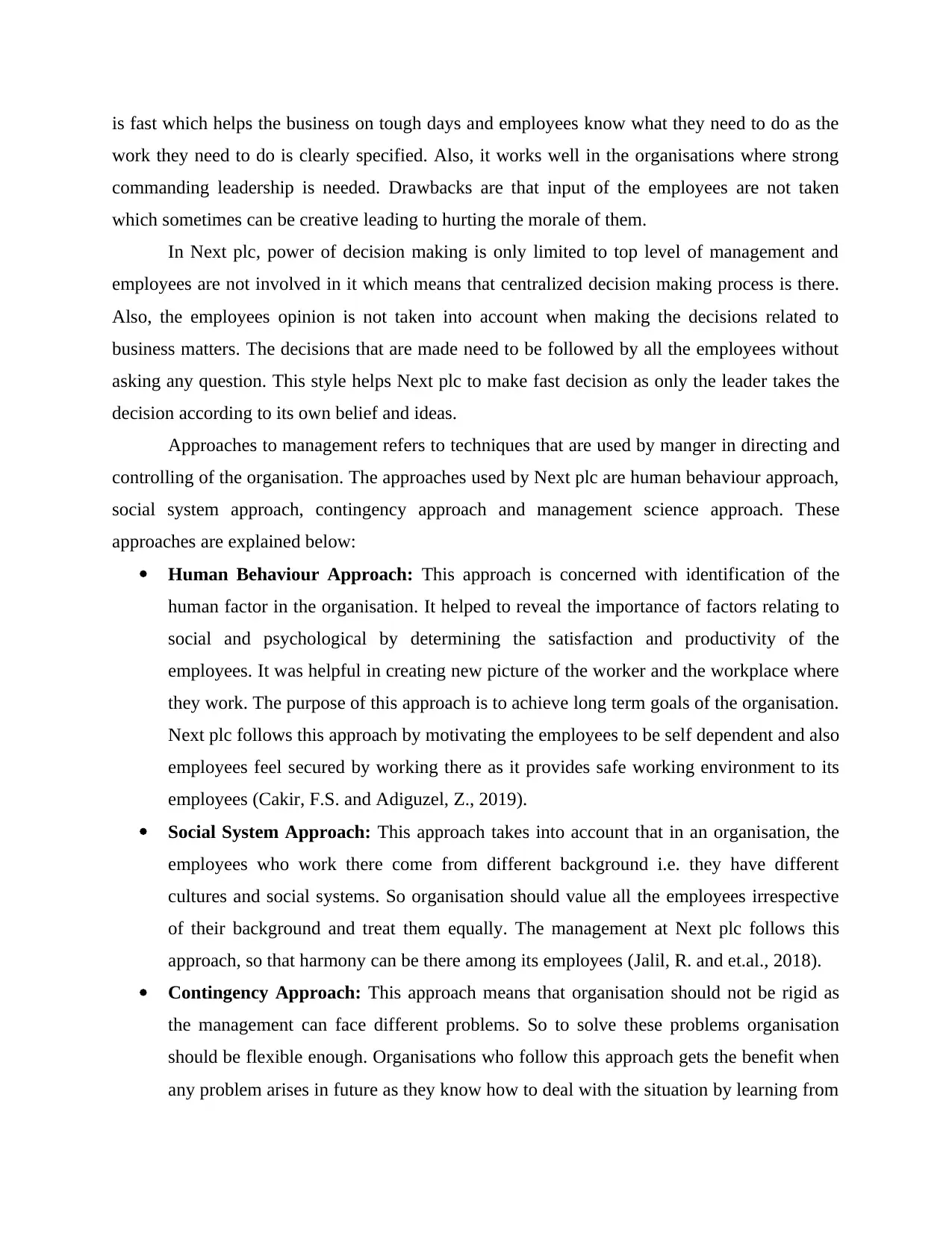
is fast which helps the business on tough days and employees know what they need to do as the
work they need to do is clearly specified. Also, it works well in the organisations where strong
commanding leadership is needed. Drawbacks are that input of the employees are not taken
which sometimes can be creative leading to hurting the morale of them.
In Next plc, power of decision making is only limited to top level of management and
employees are not involved in it which means that centralized decision making process is there.
Also, the employees opinion is not taken into account when making the decisions related to
business matters. The decisions that are made need to be followed by all the employees without
asking any question. This style helps Next plc to make fast decision as only the leader takes the
decision according to its own belief and ideas.
Approaches to management refers to techniques that are used by manger in directing and
controlling of the organisation. The approaches used by Next plc are human behaviour approach,
social system approach, contingency approach and management science approach. These
approaches are explained below:
Human Behaviour Approach: This approach is concerned with identification of the
human factor in the organisation. It helped to reveal the importance of factors relating to
social and psychological by determining the satisfaction and productivity of the
employees. It was helpful in creating new picture of the worker and the workplace where
they work. The purpose of this approach is to achieve long term goals of the organisation.
Next plc follows this approach by motivating the employees to be self dependent and also
employees feel secured by working there as it provides safe working environment to its
employees (Cakir, F.S. and Adiguzel, Z., 2019).
Social System Approach: This approach takes into account that in an organisation, the
employees who work there come from different background i.e. they have different
cultures and social systems. So organisation should value all the employees irrespective
of their background and treat them equally. The management at Next plc follows this
approach, so that harmony can be there among its employees (Jalil, R. and et.al., 2018).
Contingency Approach: This approach means that organisation should not be rigid as
the management can face different problems. So to solve these problems organisation
should be flexible enough. Organisations who follow this approach gets the benefit when
any problem arises in future as they know how to deal with the situation by learning from
work they need to do is clearly specified. Also, it works well in the organisations where strong
commanding leadership is needed. Drawbacks are that input of the employees are not taken
which sometimes can be creative leading to hurting the morale of them.
In Next plc, power of decision making is only limited to top level of management and
employees are not involved in it which means that centralized decision making process is there.
Also, the employees opinion is not taken into account when making the decisions related to
business matters. The decisions that are made need to be followed by all the employees without
asking any question. This style helps Next plc to make fast decision as only the leader takes the
decision according to its own belief and ideas.
Approaches to management refers to techniques that are used by manger in directing and
controlling of the organisation. The approaches used by Next plc are human behaviour approach,
social system approach, contingency approach and management science approach. These
approaches are explained below:
Human Behaviour Approach: This approach is concerned with identification of the
human factor in the organisation. It helped to reveal the importance of factors relating to
social and psychological by determining the satisfaction and productivity of the
employees. It was helpful in creating new picture of the worker and the workplace where
they work. The purpose of this approach is to achieve long term goals of the organisation.
Next plc follows this approach by motivating the employees to be self dependent and also
employees feel secured by working there as it provides safe working environment to its
employees (Cakir, F.S. and Adiguzel, Z., 2019).
Social System Approach: This approach takes into account that in an organisation, the
employees who work there come from different background i.e. they have different
cultures and social systems. So organisation should value all the employees irrespective
of their background and treat them equally. The management at Next plc follows this
approach, so that harmony can be there among its employees (Jalil, R. and et.al., 2018).
Contingency Approach: This approach means that organisation should not be rigid as
the management can face different problems. So to solve these problems organisation
should be flexible enough. Organisations who follow this approach gets the benefit when
any problem arises in future as they know how to deal with the situation by learning from
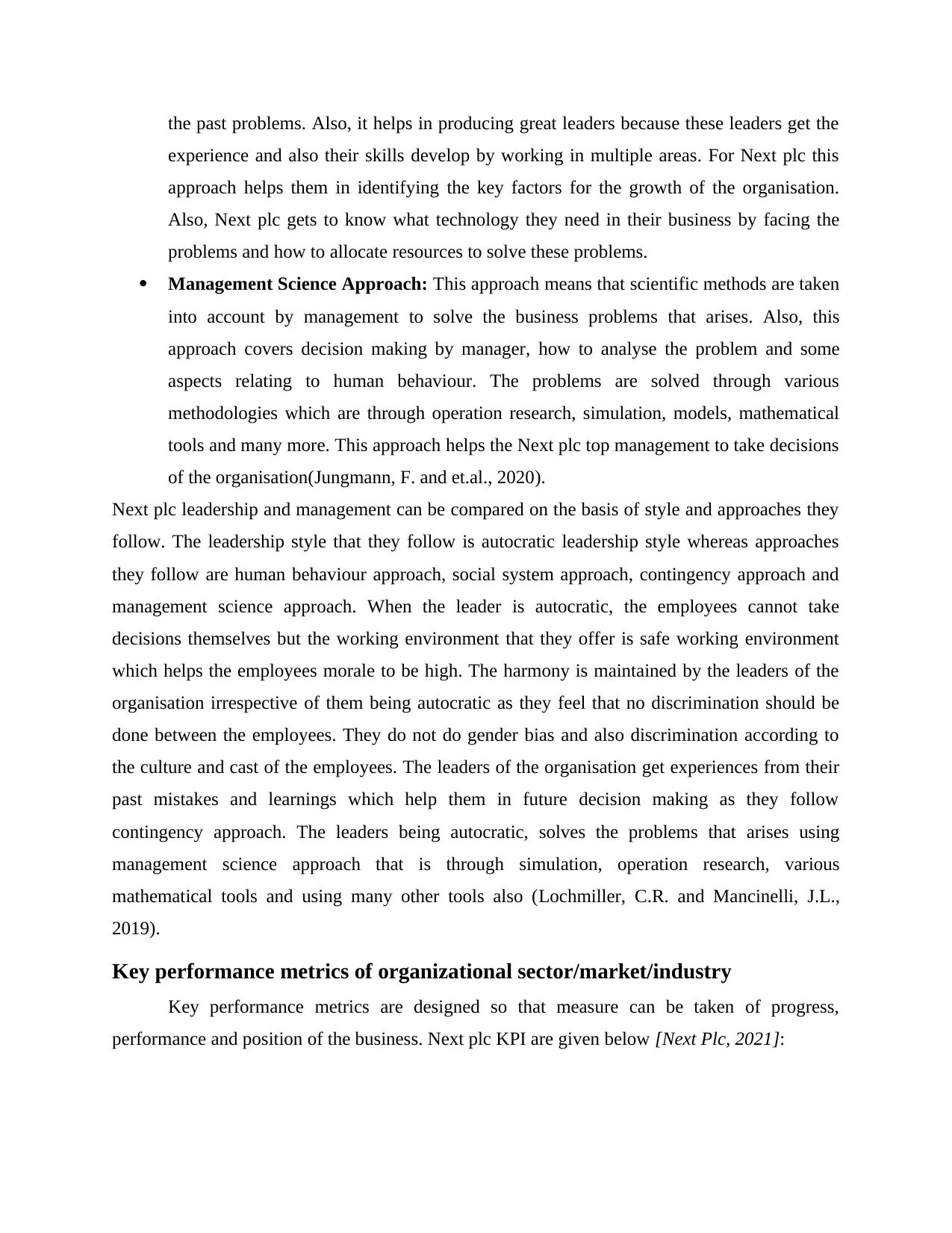
the past problems. Also, it helps in producing great leaders because these leaders get the
experience and also their skills develop by working in multiple areas. For Next plc this
approach helps them in identifying the key factors for the growth of the organisation.
Also, Next plc gets to know what technology they need in their business by facing the
problems and how to allocate resources to solve these problems.
Management Science Approach: This approach means that scientific methods are taken
into account by management to solve the business problems that arises. Also, this
approach covers decision making by manager, how to analyse the problem and some
aspects relating to human behaviour. The problems are solved through various
methodologies which are through operation research, simulation, models, mathematical
tools and many more. This approach helps the Next plc top management to take decisions
of the organisation(Jungmann, F. and et.al., 2020).
Next plc leadership and management can be compared on the basis of style and approaches they
follow. The leadership style that they follow is autocratic leadership style whereas approaches
they follow are human behaviour approach, social system approach, contingency approach and
management science approach. When the leader is autocratic, the employees cannot take
decisions themselves but the working environment that they offer is safe working environment
which helps the employees morale to be high. The harmony is maintained by the leaders of the
organisation irrespective of them being autocratic as they feel that no discrimination should be
done between the employees. They do not do gender bias and also discrimination according to
the culture and cast of the employees. The leaders of the organisation get experiences from their
past mistakes and learnings which help them in future decision making as they follow
contingency approach. The leaders being autocratic, solves the problems that arises using
management science approach that is through simulation, operation research, various
mathematical tools and using many other tools also (Lochmiller, C.R. and Mancinelli, J.L.,
2019).
Key performance metrics of organizational sector/market/industry
Key performance metrics are designed so that measure can be taken of progress,
performance and position of the business. Next plc KPI are given below [Next Plc, 2021]:
experience and also their skills develop by working in multiple areas. For Next plc this
approach helps them in identifying the key factors for the growth of the organisation.
Also, Next plc gets to know what technology they need in their business by facing the
problems and how to allocate resources to solve these problems.
Management Science Approach: This approach means that scientific methods are taken
into account by management to solve the business problems that arises. Also, this
approach covers decision making by manager, how to analyse the problem and some
aspects relating to human behaviour. The problems are solved through various
methodologies which are through operation research, simulation, models, mathematical
tools and many more. This approach helps the Next plc top management to take decisions
of the organisation(Jungmann, F. and et.al., 2020).
Next plc leadership and management can be compared on the basis of style and approaches they
follow. The leadership style that they follow is autocratic leadership style whereas approaches
they follow are human behaviour approach, social system approach, contingency approach and
management science approach. When the leader is autocratic, the employees cannot take
decisions themselves but the working environment that they offer is safe working environment
which helps the employees morale to be high. The harmony is maintained by the leaders of the
organisation irrespective of them being autocratic as they feel that no discrimination should be
done between the employees. They do not do gender bias and also discrimination according to
the culture and cast of the employees. The leaders of the organisation get experiences from their
past mistakes and learnings which help them in future decision making as they follow
contingency approach. The leaders being autocratic, solves the problems that arises using
management science approach that is through simulation, operation research, various
mathematical tools and using many other tools also (Lochmiller, C.R. and Mancinelli, J.L.,
2019).
Key performance metrics of organizational sector/market/industry
Key performance metrics are designed so that measure can be taken of progress,
performance and position of the business. Next plc KPI are given below [Next Plc, 2021]:
⊘ This is a preview!⊘
Do you want full access?
Subscribe today to unlock all pages.

Trusted by 1+ million students worldwide
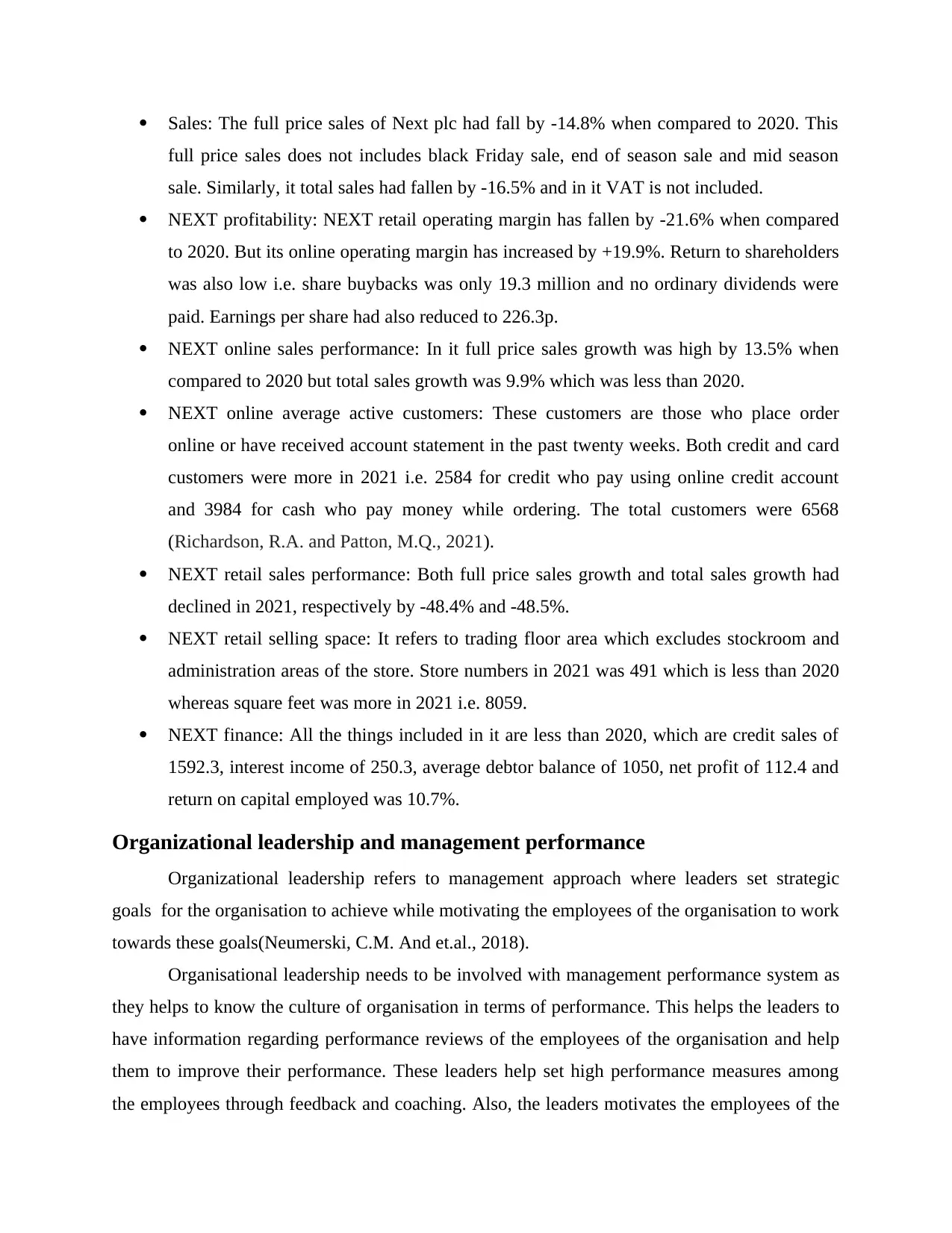
Sales: The full price sales of Next plc had fall by -14.8% when compared to 2020. This
full price sales does not includes black Friday sale, end of season sale and mid season
sale. Similarly, it total sales had fallen by -16.5% and in it VAT is not included.
NEXT profitability: NEXT retail operating margin has fallen by -21.6% when compared
to 2020. But its online operating margin has increased by +19.9%. Return to shareholders
was also low i.e. share buybacks was only 19.3 million and no ordinary dividends were
paid. Earnings per share had also reduced to 226.3p.
NEXT online sales performance: In it full price sales growth was high by 13.5% when
compared to 2020 but total sales growth was 9.9% which was less than 2020.
NEXT online average active customers: These customers are those who place order
online or have received account statement in the past twenty weeks. Both credit and card
customers were more in 2021 i.e. 2584 for credit who pay using online credit account
and 3984 for cash who pay money while ordering. The total customers were 6568
(Richardson, R.A. and Patton, M.Q., 2021).
NEXT retail sales performance: Both full price sales growth and total sales growth had
declined in 2021, respectively by -48.4% and -48.5%.
NEXT retail selling space: It refers to trading floor area which excludes stockroom and
administration areas of the store. Store numbers in 2021 was 491 which is less than 2020
whereas square feet was more in 2021 i.e. 8059.
NEXT finance: All the things included in it are less than 2020, which are credit sales of
1592.3, interest income of 250.3, average debtor balance of 1050, net profit of 112.4 and
return on capital employed was 10.7%.
Organizational leadership and management performance
Organizational leadership refers to management approach where leaders set strategic
goals for the organisation to achieve while motivating the employees of the organisation to work
towards these goals(Neumerski, C.M. And et.al., 2018).
Organisational leadership needs to be involved with management performance system as
they helps to know the culture of organisation in terms of performance. This helps the leaders to
have information regarding performance reviews of the employees of the organisation and help
them to improve their performance. These leaders help set high performance measures among
the employees through feedback and coaching. Also, the leaders motivates the employees of the
full price sales does not includes black Friday sale, end of season sale and mid season
sale. Similarly, it total sales had fallen by -16.5% and in it VAT is not included.
NEXT profitability: NEXT retail operating margin has fallen by -21.6% when compared
to 2020. But its online operating margin has increased by +19.9%. Return to shareholders
was also low i.e. share buybacks was only 19.3 million and no ordinary dividends were
paid. Earnings per share had also reduced to 226.3p.
NEXT online sales performance: In it full price sales growth was high by 13.5% when
compared to 2020 but total sales growth was 9.9% which was less than 2020.
NEXT online average active customers: These customers are those who place order
online or have received account statement in the past twenty weeks. Both credit and card
customers were more in 2021 i.e. 2584 for credit who pay using online credit account
and 3984 for cash who pay money while ordering. The total customers were 6568
(Richardson, R.A. and Patton, M.Q., 2021).
NEXT retail sales performance: Both full price sales growth and total sales growth had
declined in 2021, respectively by -48.4% and -48.5%.
NEXT retail selling space: It refers to trading floor area which excludes stockroom and
administration areas of the store. Store numbers in 2021 was 491 which is less than 2020
whereas square feet was more in 2021 i.e. 8059.
NEXT finance: All the things included in it are less than 2020, which are credit sales of
1592.3, interest income of 250.3, average debtor balance of 1050, net profit of 112.4 and
return on capital employed was 10.7%.
Organizational leadership and management performance
Organizational leadership refers to management approach where leaders set strategic
goals for the organisation to achieve while motivating the employees of the organisation to work
towards these goals(Neumerski, C.M. And et.al., 2018).
Organisational leadership needs to be involved with management performance system as
they helps to know the culture of organisation in terms of performance. This helps the leaders to
have information regarding performance reviews of the employees of the organisation and help
them to improve their performance. These leaders help set high performance measures among
the employees through feedback and coaching. Also, the leaders motivates the employees of the
Paraphrase This Document
Need a fresh take? Get an instant paraphrase of this document with our AI Paraphraser
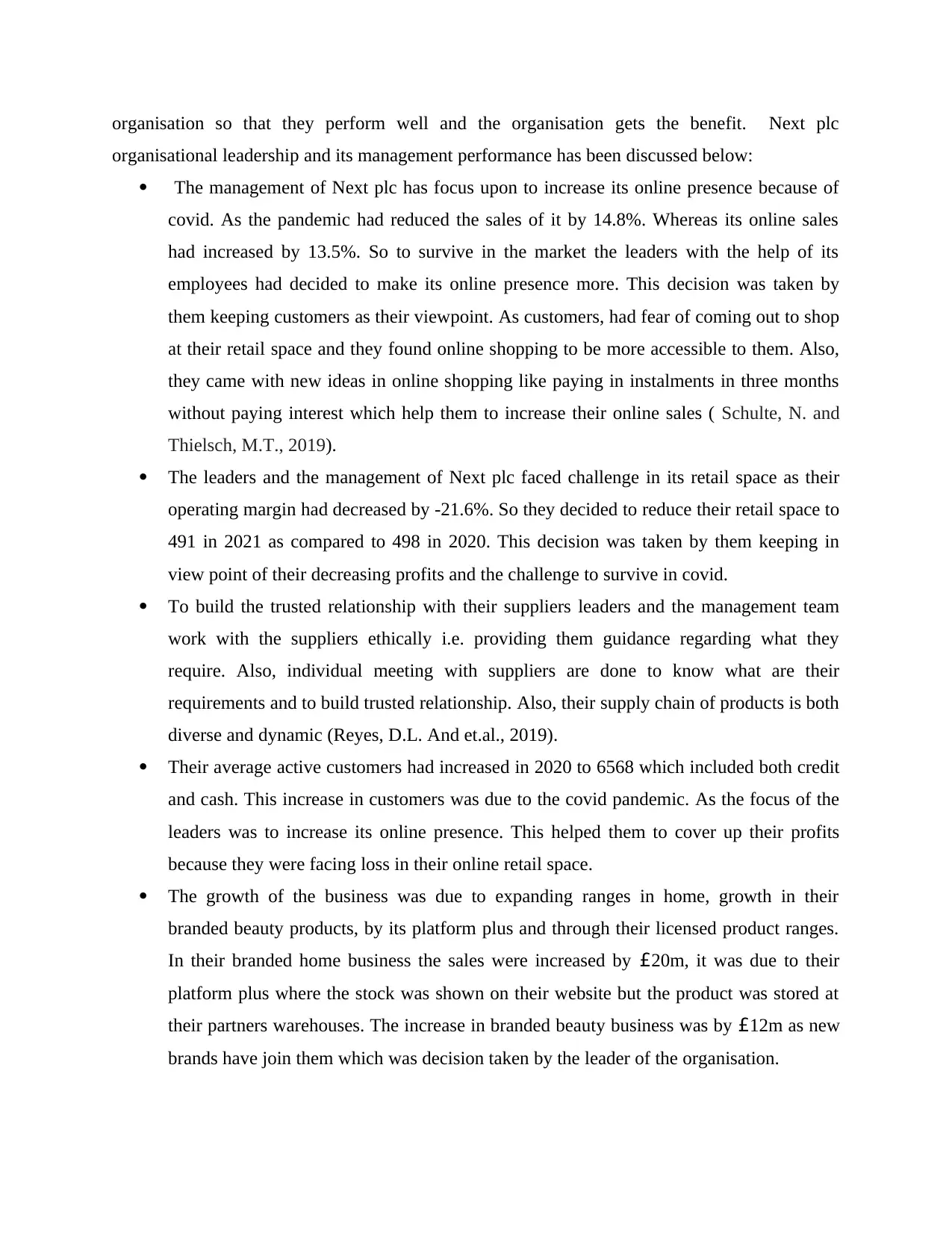
organisation so that they perform well and the organisation gets the benefit. Next plc
organisational leadership and its management performance has been discussed below:
The management of Next plc has focus upon to increase its online presence because of
covid. As the pandemic had reduced the sales of it by 14.8%. Whereas its online sales
had increased by 13.5%. So to survive in the market the leaders with the help of its
employees had decided to make its online presence more. This decision was taken by
them keeping customers as their viewpoint. As customers, had fear of coming out to shop
at their retail space and they found online shopping to be more accessible to them. Also,
they came with new ideas in online shopping like paying in instalments in three months
without paying interest which help them to increase their online sales ( Schulte, N. and
Thielsch, M.T., 2019).
The leaders and the management of Next plc faced challenge in its retail space as their
operating margin had decreased by -21.6%. So they decided to reduce their retail space to
491 in 2021 as compared to 498 in 2020. This decision was taken by them keeping in
view point of their decreasing profits and the challenge to survive in covid.
To build the trusted relationship with their suppliers leaders and the management team
work with the suppliers ethically i.e. providing them guidance regarding what they
require. Also, individual meeting with suppliers are done to know what are their
requirements and to build trusted relationship. Also, their supply chain of products is both
diverse and dynamic (Reyes, D.L. And et.al., 2019).
Their average active customers had increased in 2020 to 6568 which included both credit
and cash. This increase in customers was due to the covid pandemic. As the focus of the
leaders was to increase its online presence. This helped them to cover up their profits
because they were facing loss in their online retail space.
The growth of the business was due to expanding ranges in home, growth in their
branded beauty products, by its platform plus and through their licensed product ranges.
In their branded home business the sales were increased by £20m, it was due to their
platform plus where the stock was shown on their website but the product was stored at
their partners warehouses. The increase in branded beauty business was by £12m as new
brands have join them which was decision taken by the leader of the organisation.
organisational leadership and its management performance has been discussed below:
The management of Next plc has focus upon to increase its online presence because of
covid. As the pandemic had reduced the sales of it by 14.8%. Whereas its online sales
had increased by 13.5%. So to survive in the market the leaders with the help of its
employees had decided to make its online presence more. This decision was taken by
them keeping customers as their viewpoint. As customers, had fear of coming out to shop
at their retail space and they found online shopping to be more accessible to them. Also,
they came with new ideas in online shopping like paying in instalments in three months
without paying interest which help them to increase their online sales ( Schulte, N. and
Thielsch, M.T., 2019).
The leaders and the management of Next plc faced challenge in its retail space as their
operating margin had decreased by -21.6%. So they decided to reduce their retail space to
491 in 2021 as compared to 498 in 2020. This decision was taken by them keeping in
view point of their decreasing profits and the challenge to survive in covid.
To build the trusted relationship with their suppliers leaders and the management team
work with the suppliers ethically i.e. providing them guidance regarding what they
require. Also, individual meeting with suppliers are done to know what are their
requirements and to build trusted relationship. Also, their supply chain of products is both
diverse and dynamic (Reyes, D.L. And et.al., 2019).
Their average active customers had increased in 2020 to 6568 which included both credit
and cash. This increase in customers was due to the covid pandemic. As the focus of the
leaders was to increase its online presence. This helped them to cover up their profits
because they were facing loss in their online retail space.
The growth of the business was due to expanding ranges in home, growth in their
branded beauty products, by its platform plus and through their licensed product ranges.
In their branded home business the sales were increased by £20m, it was due to their
platform plus where the stock was shown on their website but the product was stored at
their partners warehouses. The increase in branded beauty business was by £12m as new
brands have join them which was decision taken by the leader of the organisation.
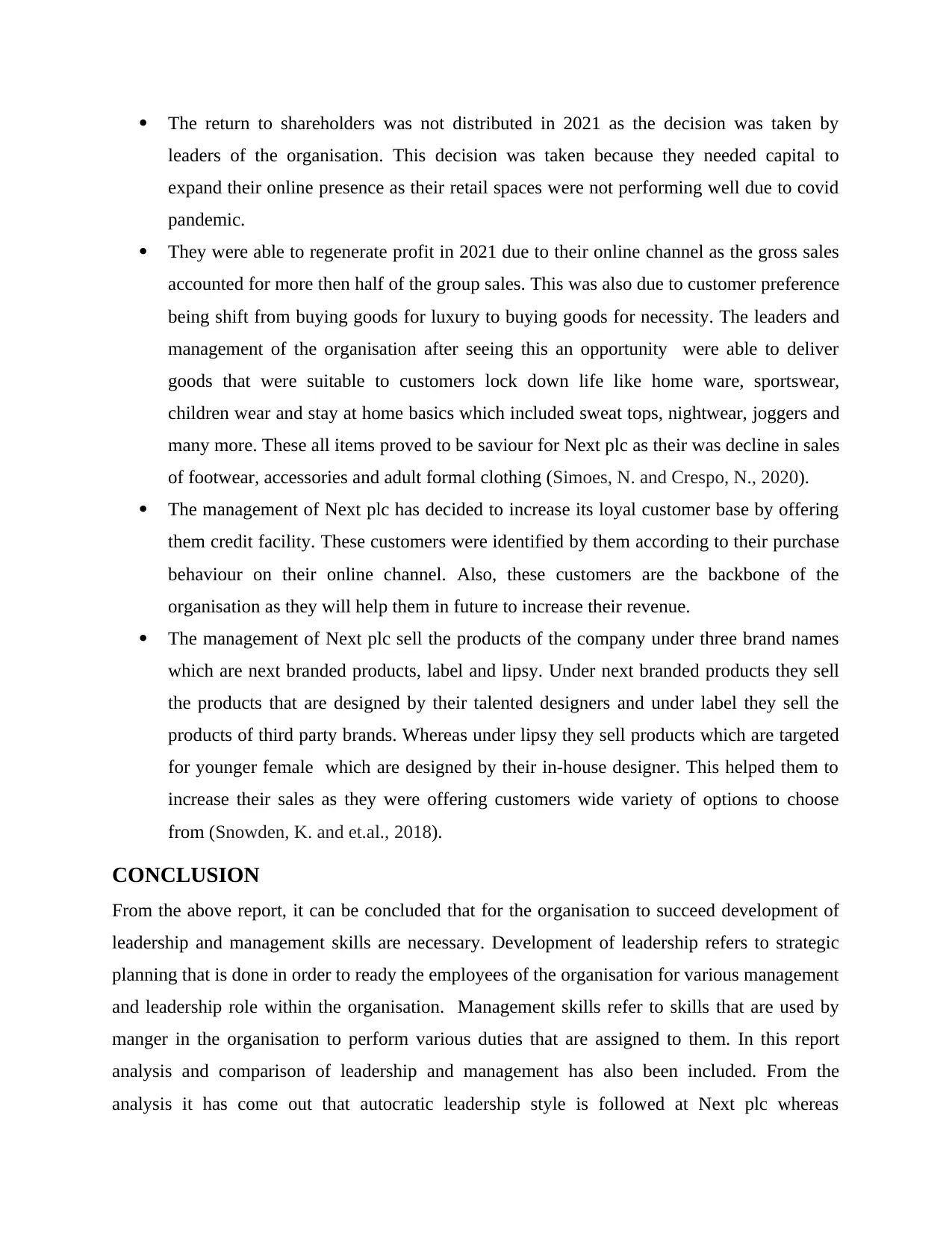
The return to shareholders was not distributed in 2021 as the decision was taken by
leaders of the organisation. This decision was taken because they needed capital to
expand their online presence as their retail spaces were not performing well due to covid
pandemic.
They were able to regenerate profit in 2021 due to their online channel as the gross sales
accounted for more then half of the group sales. This was also due to customer preference
being shift from buying goods for luxury to buying goods for necessity. The leaders and
management of the organisation after seeing this an opportunity were able to deliver
goods that were suitable to customers lock down life like home ware, sportswear,
children wear and stay at home basics which included sweat tops, nightwear, joggers and
many more. These all items proved to be saviour for Next plc as their was decline in sales
of footwear, accessories and adult formal clothing (Simoes, N. and Crespo, N., 2020).
The management of Next plc has decided to increase its loyal customer base by offering
them credit facility. These customers were identified by them according to their purchase
behaviour on their online channel. Also, these customers are the backbone of the
organisation as they will help them in future to increase their revenue.
The management of Next plc sell the products of the company under three brand names
which are next branded products, label and lipsy. Under next branded products they sell
the products that are designed by their talented designers and under label they sell the
products of third party brands. Whereas under lipsy they sell products which are targeted
for younger female which are designed by their in-house designer. This helped them to
increase their sales as they were offering customers wide variety of options to choose
from (Snowden, K. and et.al., 2018).
CONCLUSION
From the above report, it can be concluded that for the organisation to succeed development of
leadership and management skills are necessary. Development of leadership refers to strategic
planning that is done in order to ready the employees of the organisation for various management
and leadership role within the organisation. Management skills refer to skills that are used by
manger in the organisation to perform various duties that are assigned to them. In this report
analysis and comparison of leadership and management has also been included. From the
analysis it has come out that autocratic leadership style is followed at Next plc whereas
leaders of the organisation. This decision was taken because they needed capital to
expand their online presence as their retail spaces were not performing well due to covid
pandemic.
They were able to regenerate profit in 2021 due to their online channel as the gross sales
accounted for more then half of the group sales. This was also due to customer preference
being shift from buying goods for luxury to buying goods for necessity. The leaders and
management of the organisation after seeing this an opportunity were able to deliver
goods that were suitable to customers lock down life like home ware, sportswear,
children wear and stay at home basics which included sweat tops, nightwear, joggers and
many more. These all items proved to be saviour for Next plc as their was decline in sales
of footwear, accessories and adult formal clothing (Simoes, N. and Crespo, N., 2020).
The management of Next plc has decided to increase its loyal customer base by offering
them credit facility. These customers were identified by them according to their purchase
behaviour on their online channel. Also, these customers are the backbone of the
organisation as they will help them in future to increase their revenue.
The management of Next plc sell the products of the company under three brand names
which are next branded products, label and lipsy. Under next branded products they sell
the products that are designed by their talented designers and under label they sell the
products of third party brands. Whereas under lipsy they sell products which are targeted
for younger female which are designed by their in-house designer. This helped them to
increase their sales as they were offering customers wide variety of options to choose
from (Snowden, K. and et.al., 2018).
CONCLUSION
From the above report, it can be concluded that for the organisation to succeed development of
leadership and management skills are necessary. Development of leadership refers to strategic
planning that is done in order to ready the employees of the organisation for various management
and leadership role within the organisation. Management skills refer to skills that are used by
manger in the organisation to perform various duties that are assigned to them. In this report
analysis and comparison of leadership and management has also been included. From the
analysis it has come out that autocratic leadership style is followed at Next plc whereas
⊘ This is a preview!⊘
Do you want full access?
Subscribe today to unlock all pages.

Trusted by 1+ million students worldwide
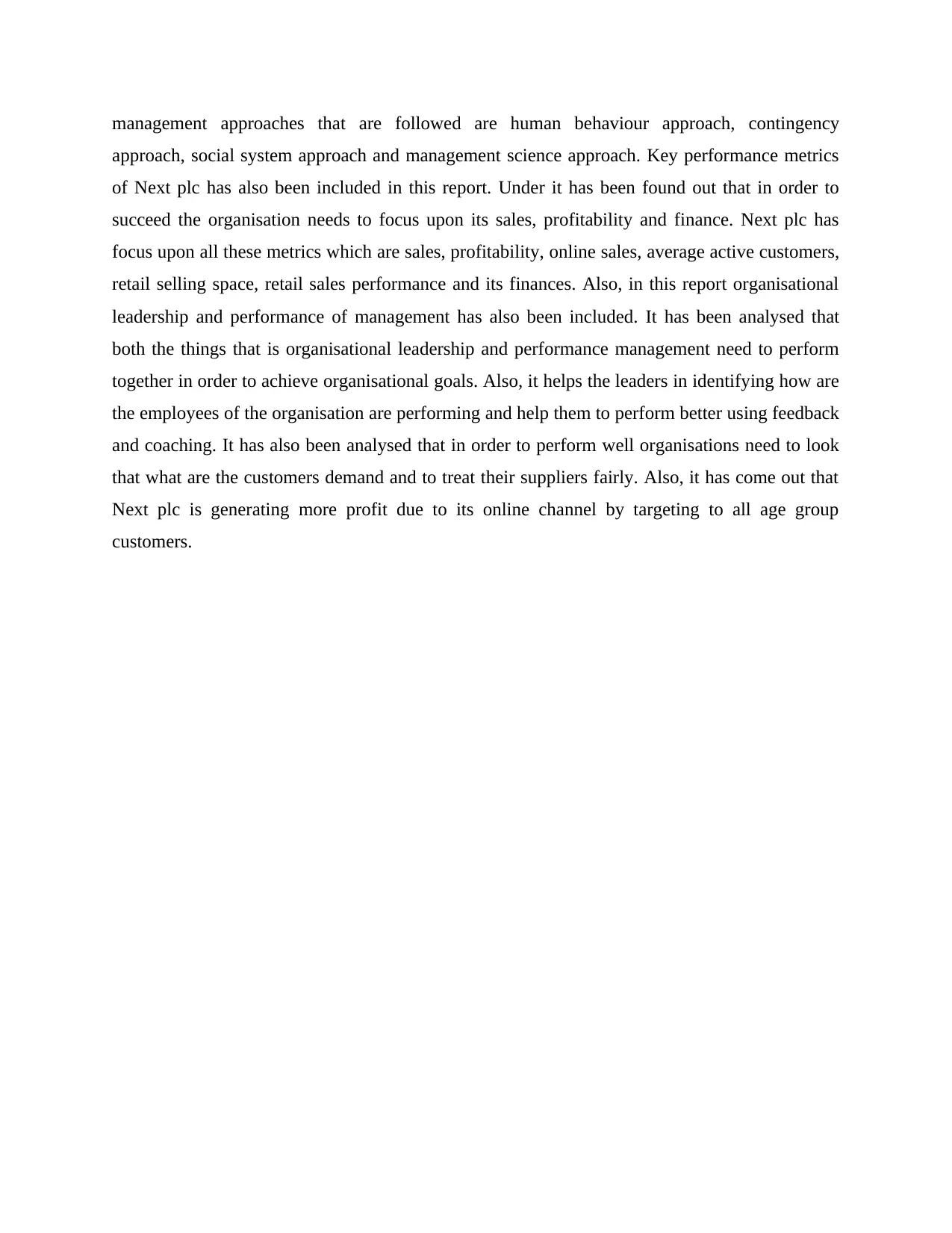
management approaches that are followed are human behaviour approach, contingency
approach, social system approach and management science approach. Key performance metrics
of Next plc has also been included in this report. Under it has been found out that in order to
succeed the organisation needs to focus upon its sales, profitability and finance. Next plc has
focus upon all these metrics which are sales, profitability, online sales, average active customers,
retail selling space, retail sales performance and its finances. Also, in this report organisational
leadership and performance of management has also been included. It has been analysed that
both the things that is organisational leadership and performance management need to perform
together in order to achieve organisational goals. Also, it helps the leaders in identifying how are
the employees of the organisation are performing and help them to perform better using feedback
and coaching. It has also been analysed that in order to perform well organisations need to look
that what are the customers demand and to treat their suppliers fairly. Also, it has come out that
Next plc is generating more profit due to its online channel by targeting to all age group
customers.
approach, social system approach and management science approach. Key performance metrics
of Next plc has also been included in this report. Under it has been found out that in order to
succeed the organisation needs to focus upon its sales, profitability and finance. Next plc has
focus upon all these metrics which are sales, profitability, online sales, average active customers,
retail selling space, retail sales performance and its finances. Also, in this report organisational
leadership and performance of management has also been included. It has been analysed that
both the things that is organisational leadership and performance management need to perform
together in order to achieve organisational goals. Also, it helps the leaders in identifying how are
the employees of the organisation are performing and help them to perform better using feedback
and coaching. It has also been analysed that in order to perform well organisations need to look
that what are the customers demand and to treat their suppliers fairly. Also, it has come out that
Next plc is generating more profit due to its online channel by targeting to all age group
customers.
Paraphrase This Document
Need a fresh take? Get an instant paraphrase of this document with our AI Paraphraser
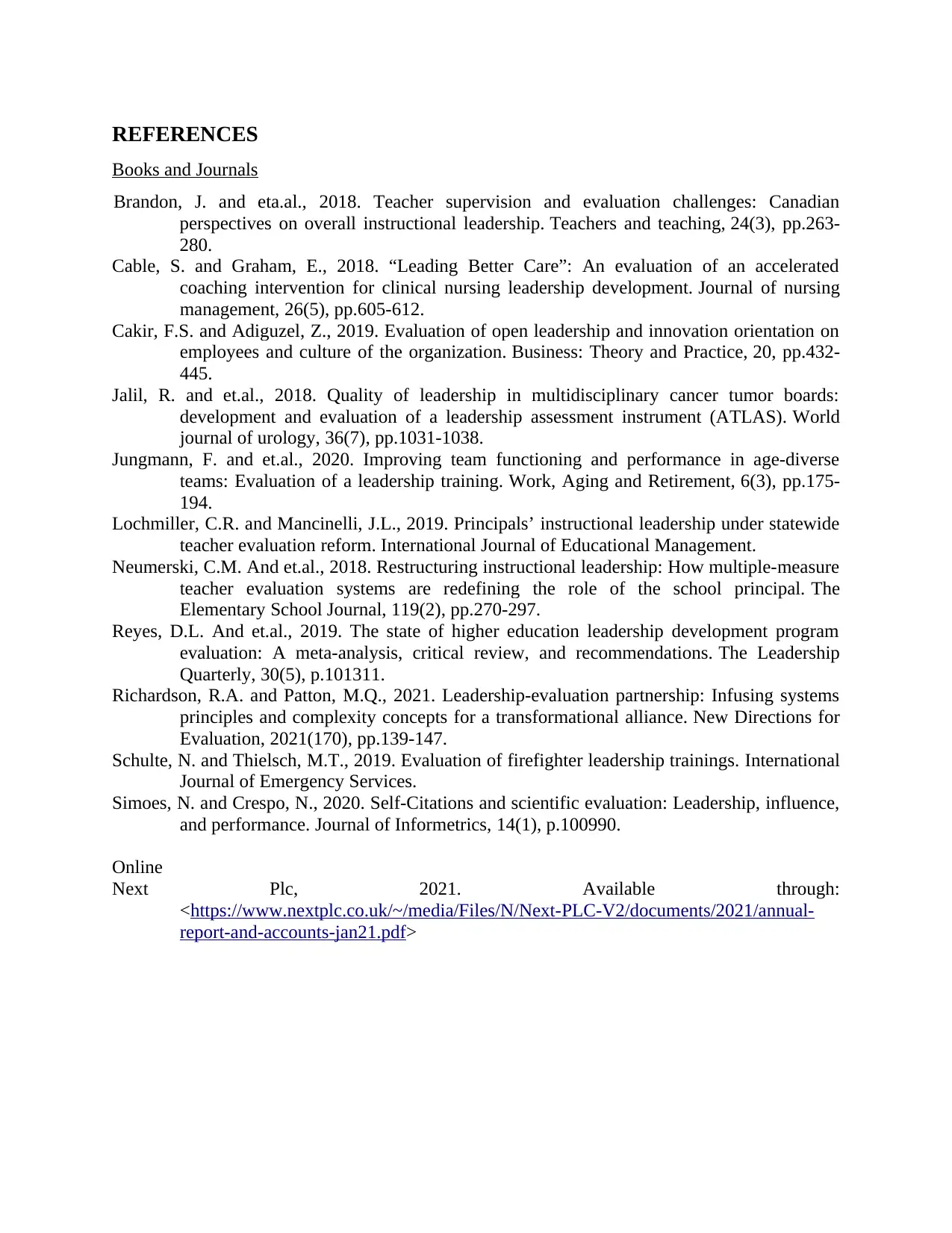
REFERENCES
Books and Journals
Brandon, J. and eta.al., 2018. Teacher supervision and evaluation challenges: Canadian
perspectives on overall instructional leadership. Teachers and teaching, 24(3), pp.263-
280.
Cable, S. and Graham, E., 2018. “Leading Better Care”: An evaluation of an accelerated
coaching intervention for clinical nursing leadership development. Journal of nursing
management, 26(5), pp.605-612.
Cakir, F.S. and Adiguzel, Z., 2019. Evaluation of open leadership and innovation orientation on
employees and culture of the organization. Business: Theory and Practice, 20, pp.432-
445.
Jalil, R. and et.al., 2018. Quality of leadership in multidisciplinary cancer tumor boards:
development and evaluation of a leadership assessment instrument (ATLAS). World
journal of urology, 36(7), pp.1031-1038.
Jungmann, F. and et.al., 2020. Improving team functioning and performance in age-diverse
teams: Evaluation of a leadership training. Work, Aging and Retirement, 6(3), pp.175-
194.
Lochmiller, C.R. and Mancinelli, J.L., 2019. Principals’ instructional leadership under statewide
teacher evaluation reform. International Journal of Educational Management.
Neumerski, C.M. And et.al., 2018. Restructuring instructional leadership: How multiple-measure
teacher evaluation systems are redefining the role of the school principal. The
Elementary School Journal, 119(2), pp.270-297.
Reyes, D.L. And et.al., 2019. The state of higher education leadership development program
evaluation: A meta-analysis, critical review, and recommendations. The Leadership
Quarterly, 30(5), p.101311.
Richardson, R.A. and Patton, M.Q., 2021. Leadership‐evaluation partnership: Infusing systems
principles and complexity concepts for a transformational alliance. New Directions for
Evaluation, 2021(170), pp.139-147.
Schulte, N. and Thielsch, M.T., 2019. Evaluation of firefighter leadership trainings. International
Journal of Emergency Services.
Simoes, N. and Crespo, N., 2020. Self-Citations and scientific evaluation: Leadership, influence,
and performance. Journal of Informetrics, 14(1), p.100990.
Online
Next Plc, 2021. Available through:
<https://www.nextplc.co.uk/~/media/Files/N/Next-PLC-V2/documents/2021/annual-
report-and-accounts-jan21.pdf>
Books and Journals
Brandon, J. and eta.al., 2018. Teacher supervision and evaluation challenges: Canadian
perspectives on overall instructional leadership. Teachers and teaching, 24(3), pp.263-
280.
Cable, S. and Graham, E., 2018. “Leading Better Care”: An evaluation of an accelerated
coaching intervention for clinical nursing leadership development. Journal of nursing
management, 26(5), pp.605-612.
Cakir, F.S. and Adiguzel, Z., 2019. Evaluation of open leadership and innovation orientation on
employees and culture of the organization. Business: Theory and Practice, 20, pp.432-
445.
Jalil, R. and et.al., 2018. Quality of leadership in multidisciplinary cancer tumor boards:
development and evaluation of a leadership assessment instrument (ATLAS). World
journal of urology, 36(7), pp.1031-1038.
Jungmann, F. and et.al., 2020. Improving team functioning and performance in age-diverse
teams: Evaluation of a leadership training. Work, Aging and Retirement, 6(3), pp.175-
194.
Lochmiller, C.R. and Mancinelli, J.L., 2019. Principals’ instructional leadership under statewide
teacher evaluation reform. International Journal of Educational Management.
Neumerski, C.M. And et.al., 2018. Restructuring instructional leadership: How multiple-measure
teacher evaluation systems are redefining the role of the school principal. The
Elementary School Journal, 119(2), pp.270-297.
Reyes, D.L. And et.al., 2019. The state of higher education leadership development program
evaluation: A meta-analysis, critical review, and recommendations. The Leadership
Quarterly, 30(5), p.101311.
Richardson, R.A. and Patton, M.Q., 2021. Leadership‐evaluation partnership: Infusing systems
principles and complexity concepts for a transformational alliance. New Directions for
Evaluation, 2021(170), pp.139-147.
Schulte, N. and Thielsch, M.T., 2019. Evaluation of firefighter leadership trainings. International
Journal of Emergency Services.
Simoes, N. and Crespo, N., 2020. Self-Citations and scientific evaluation: Leadership, influence,
and performance. Journal of Informetrics, 14(1), p.100990.
Online
Next Plc, 2021. Available through:
<https://www.nextplc.co.uk/~/media/Files/N/Next-PLC-V2/documents/2021/annual-
report-and-accounts-jan21.pdf>
1 out of 11
Related Documents
Your All-in-One AI-Powered Toolkit for Academic Success.
+13062052269
info@desklib.com
Available 24*7 on WhatsApp / Email
![[object Object]](/_next/static/media/star-bottom.7253800d.svg)
Unlock your academic potential
Copyright © 2020–2025 A2Z Services. All Rights Reserved. Developed and managed by ZUCOL.




